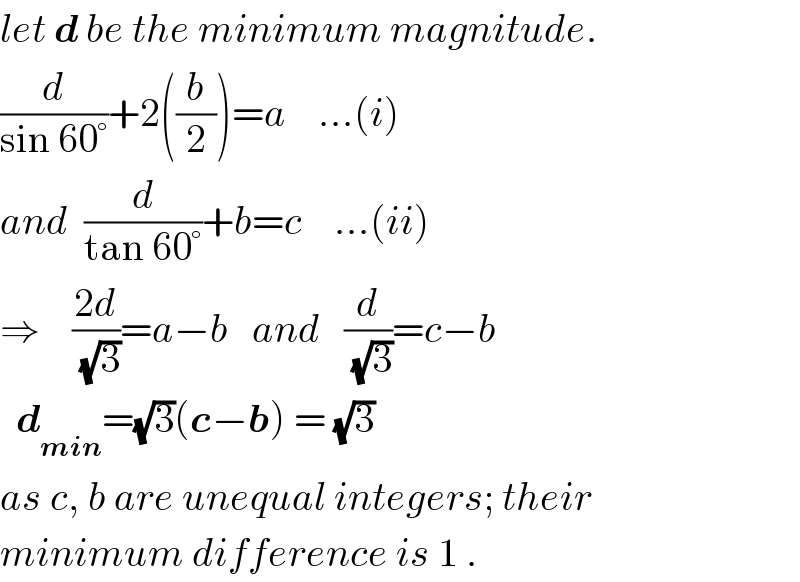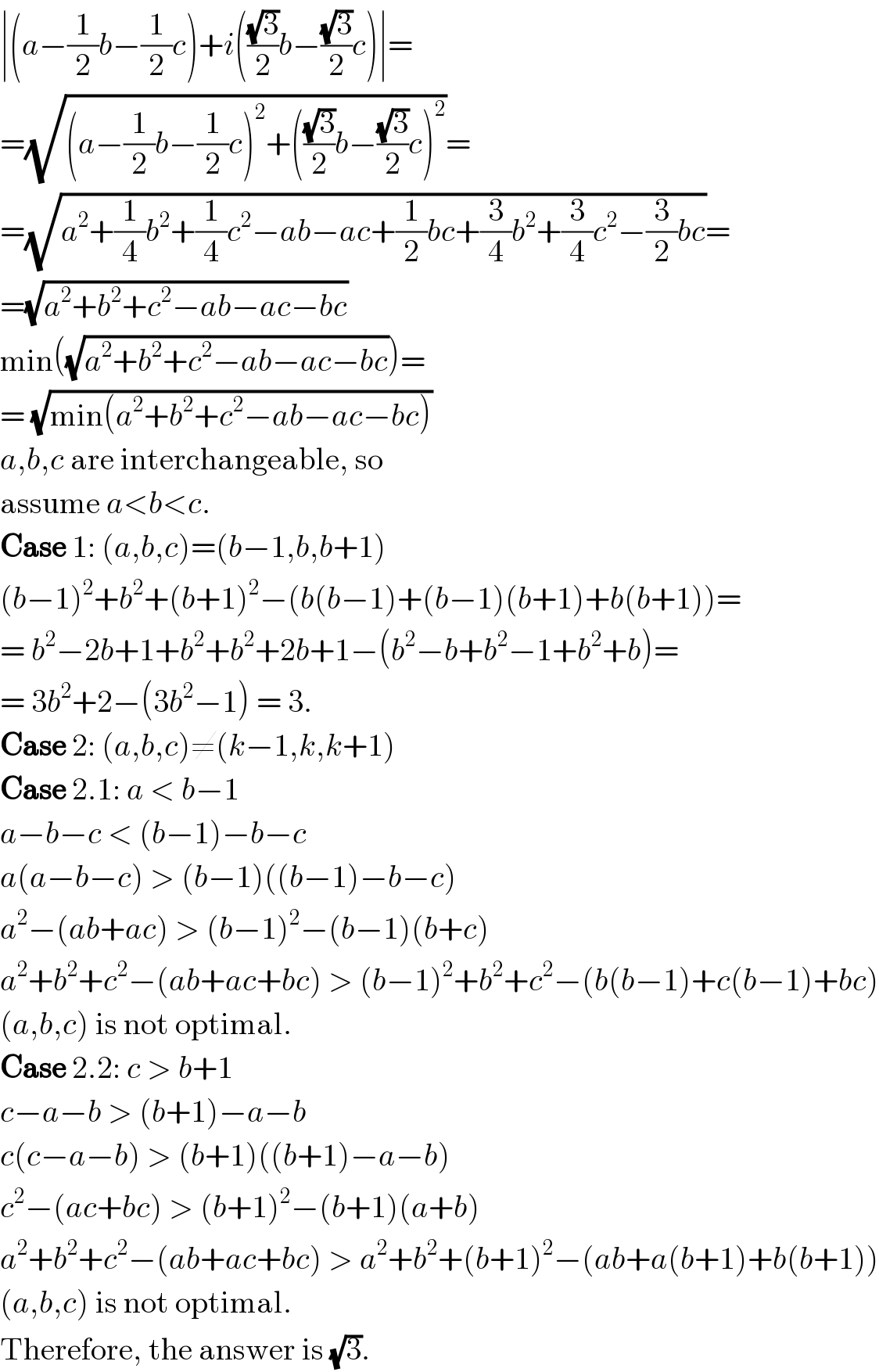
Question Number 20551 by Tinkutara last updated on 28/Aug/17

$${Find}\:{the}\:{minimum}\:{value}\:{of} \\ $$$$\mid{a}\:+\:{b}\omega\:+\:{c}\omega^{\mathrm{2}} \mid,\:{where}\:{a},\:{b}\:{and}\:{c}\:{are}\:{all} \\ $$$${not}\:{equal}\:{integers}\:{and}\:\omega\left(\neq\mathrm{1}\right)\:{is}\:{a}\:{cube} \\ $$$${root}\:{of}\:{unity}. \\ $$
Commented by ajfour last updated on 28/Aug/17

Commented by ajfour last updated on 28/Aug/17

$${let}\:\boldsymbol{{d}}\:{be}\:{the}\:{minimum}\:{magnitude}. \\ $$$$\frac{{d}}{\mathrm{sin}\:\mathrm{60}°}+\mathrm{2}\left(\frac{{b}}{\mathrm{2}}\right)={a}\:\:\:\:...\left({i}\right) \\ $$$${and}\:\:\frac{{d}}{\mathrm{tan}\:\mathrm{60}°}+{b}={c}\:\:\:\:...\left({ii}\right) \\ $$$$\Rightarrow\:\:\:\:\frac{\mathrm{2}{d}}{\sqrt{\mathrm{3}}}={a}−{b}\:\:\:{and}\:\:\:\frac{{d}}{\sqrt{\mathrm{3}}}={c}−{b} \\ $$$$\:\:\boldsymbol{{d}}_{\boldsymbol{{min}}} =\sqrt{\mathrm{3}}\left(\boldsymbol{{c}}−\boldsymbol{{b}}\right)\:=\:\sqrt{\mathrm{3}} \\ $$$${as}\:{c},\:{b}\:{are}\:{unequal}\:{integers};\:{their} \\ $$$${minimum}\:{difference}\:{is}\:\mathrm{1}\:. \\ $$
Commented by Tinkutara last updated on 28/Aug/17

$$\mathrm{You}\:\mathrm{all}\:\mathrm{got}\:\sqrt{\mathrm{3}},\:\mathrm{but}\:\mathrm{in}\:\mathrm{my}\:\mathrm{book}\:\mathrm{answer} \\ $$$$\mathrm{is}\:\mathrm{explained}\:\mathrm{and}\:\mathrm{they}\:\mathrm{got}\:\mathrm{1}.\:\mathrm{Can}\:\mathrm{you} \\ $$$$\mathrm{find}\:\mathrm{the}\:\mathrm{error}\:\mathrm{in}\:\mathrm{my}\:\mathrm{book}? \\ $$
Commented by Tinkutara last updated on 28/Aug/17

Commented by dioph last updated on 28/Aug/17

$$\mathrm{I}\:\mathrm{guess}\:\mathrm{we}\:\mathrm{assumed}\:{a}\neq{b},\:{a}\neq{c}\:\mathrm{and} \\ $$$${b}\neq{c},\:\mathrm{when}\:\mathrm{in}\:\mathrm{fact}\:\mathrm{the}\:\mathrm{book}\:\mathrm{says} \\ $$$$\mathrm{two}\:\mathrm{of}\:\mathrm{them}\:\mathrm{can}\:\mathrm{be}\:\mathrm{equal}\:\left(\mathrm{just}\:\mathrm{not}\right. \\ $$$$\left.\mathrm{all}\:\mathrm{of}\:\mathrm{them}\:\mathrm{at}\:\mathrm{once}\right) \\ $$
Commented by Tinkutara last updated on 28/Aug/17

$$\mathrm{So}\:\mathrm{1}\:\mathrm{is}\:\mathrm{correct}? \\ $$
Commented by ajfour last updated on 28/Aug/17

$${question}\:{states}\:'{all}\:{not}\:{equal}' \\ $$$${so}\:\mathrm{1}\:{is}\:{true}.{for}\:{example}, \\ $$$${a}−\mathrm{1}={b}={c}. \\ $$
Commented by Tinkutara last updated on 28/Aug/17

$$\mathrm{Thank}\:\mathrm{you}\:\mathrm{very}\:\mathrm{much}\:\mathrm{ajfour}\:\mathrm{Sir}! \\ $$
Answered by dioph last updated on 28/Aug/17

$$\mid\left({a}−\frac{\mathrm{1}}{\mathrm{2}}{b}−\frac{\mathrm{1}}{\mathrm{2}}{c}\right)+{i}\left(\frac{\sqrt{\mathrm{3}}}{\mathrm{2}}{b}−\frac{\sqrt{\mathrm{3}}}{\mathrm{2}}{c}\right)\mid= \\ $$$$=\sqrt{\left({a}−\frac{\mathrm{1}}{\mathrm{2}}{b}−\frac{\mathrm{1}}{\mathrm{2}}{c}\right)^{\mathrm{2}} +\left(\frac{\sqrt{\mathrm{3}}}{\mathrm{2}}{b}−\frac{\sqrt{\mathrm{3}}}{\mathrm{2}}{c}\right)^{\mathrm{2}} }= \\ $$$$=\sqrt{{a}^{\mathrm{2}} +\frac{\mathrm{1}}{\mathrm{4}}{b}^{\mathrm{2}} +\frac{\mathrm{1}}{\mathrm{4}}{c}^{\mathrm{2}} −{ab}−{ac}+\frac{\mathrm{1}}{\mathrm{2}}{bc}+\frac{\mathrm{3}}{\mathrm{4}}{b}^{\mathrm{2}} +\frac{\mathrm{3}}{\mathrm{4}}{c}^{\mathrm{2}} −\frac{\mathrm{3}}{\mathrm{2}}{bc}}= \\ $$$$=\sqrt{{a}^{\mathrm{2}} +{b}^{\mathrm{2}} +{c}^{\mathrm{2}} −{ab}−{ac}−{bc}} \\ $$$$\mathrm{min}\left(\sqrt{{a}^{\mathrm{2}} +{b}^{\mathrm{2}} +{c}^{\mathrm{2}} −{ab}−{ac}−{bc}}\right)= \\ $$$$=\:\sqrt{\mathrm{min}\left({a}^{\mathrm{2}} +{b}^{\mathrm{2}} +{c}^{\mathrm{2}} −{ab}−{ac}−{bc}\right)} \\ $$$${a},{b},{c}\:\mathrm{are}\:\mathrm{interchangeable},\:\mathrm{so} \\ $$$$\mathrm{assume}\:{a}<{b}<{c}. \\ $$$$\boldsymbol{\mathrm{Case}}\:\mathrm{1}:\:\left({a},{b},{c}\right)=\left({b}−\mathrm{1},{b},{b}+\mathrm{1}\right) \\ $$$$\left({b}−\mathrm{1}\right)^{\mathrm{2}} +{b}^{\mathrm{2}} +\left({b}+\mathrm{1}\right)^{\mathrm{2}} −\left({b}\left({b}−\mathrm{1}\right)+\left({b}−\mathrm{1}\right)\left({b}+\mathrm{1}\right)+{b}\left({b}+\mathrm{1}\right)\right)= \\ $$$$=\:{b}^{\mathrm{2}} −\mathrm{2}{b}+\mathrm{1}+{b}^{\mathrm{2}} +{b}^{\mathrm{2}} +\mathrm{2}{b}+\mathrm{1}−\left({b}^{\mathrm{2}} −{b}+{b}^{\mathrm{2}} −\mathrm{1}+{b}^{\mathrm{2}} +{b}\right)= \\ $$$$=\:\mathrm{3}{b}^{\mathrm{2}} +\mathrm{2}−\left(\mathrm{3}{b}^{\mathrm{2}} −\mathrm{1}\right)\:=\:\mathrm{3}. \\ $$$$\boldsymbol{\mathrm{Case}}\:\mathrm{2}:\:\left({a},{b},{c}\right)\neq\left({k}−\mathrm{1},{k},{k}+\mathrm{1}\right) \\ $$$$\boldsymbol{\mathrm{Case}}\:\mathrm{2}.\mathrm{1}:\:{a}\:<\:{b}−\mathrm{1} \\ $$$${a}−{b}−{c}\:<\:\left({b}−\mathrm{1}\right)−{b}−{c} \\ $$$${a}\left({a}−{b}−{c}\right)\:>\:\left({b}−\mathrm{1}\right)\left(\left({b}−\mathrm{1}\right)−{b}−{c}\right) \\ $$$${a}^{\mathrm{2}} −\left({ab}+{ac}\right)\:>\:\left({b}−\mathrm{1}\right)^{\mathrm{2}} −\left({b}−\mathrm{1}\right)\left({b}+{c}\right) \\ $$$${a}^{\mathrm{2}} +{b}^{\mathrm{2}} +{c}^{\mathrm{2}} −\left({ab}+{ac}+{bc}\right)\:>\:\left({b}−\mathrm{1}\right)^{\mathrm{2}} +{b}^{\mathrm{2}} +{c}^{\mathrm{2}} −\left({b}\left({b}−\mathrm{1}\right)+{c}\left({b}−\mathrm{1}\right)+{bc}\right) \\ $$$$\left({a},{b},{c}\right)\:\mathrm{is}\:\mathrm{not}\:\mathrm{optimal}. \\ $$$$\boldsymbol{\mathrm{Case}}\:\mathrm{2}.\mathrm{2}:\:{c}\:>\:{b}+\mathrm{1} \\ $$$${c}−{a}−{b}\:>\:\left({b}+\mathrm{1}\right)−{a}−{b} \\ $$$${c}\left({c}−{a}−{b}\right)\:>\:\left({b}+\mathrm{1}\right)\left(\left({b}+\mathrm{1}\right)−{a}−{b}\right) \\ $$$${c}^{\mathrm{2}} −\left({ac}+{bc}\right)\:>\:\left({b}+\mathrm{1}\right)^{\mathrm{2}} −\left({b}+\mathrm{1}\right)\left({a}+{b}\right) \\ $$$${a}^{\mathrm{2}} +{b}^{\mathrm{2}} +{c}^{\mathrm{2}} −\left({ab}+{ac}+{bc}\right)\:>\:{a}^{\mathrm{2}} +{b}^{\mathrm{2}} +\left({b}+\mathrm{1}\right)^{\mathrm{2}} −\left({ab}+{a}\left({b}+\mathrm{1}\right)+{b}\left({b}+\mathrm{1}\right)\right) \\ $$$$\left({a},{b},{c}\right)\:\mathrm{is}\:\mathrm{not}\:\mathrm{optimal}. \\ $$$$\mathrm{Therefore},\:\mathrm{the}\:\mathrm{answer}\:\mathrm{is}\:\sqrt{\mathrm{3}}. \\ $$
Commented by Tinkutara last updated on 28/Aug/17

$$\mathrm{Thank}\:\mathrm{you}\:\mathrm{very}\:\mathrm{much}\:\mathrm{Sir}!\:\mathrm{This} \\ $$$$\mathrm{question}\:\mathrm{can}\:\mathrm{also}\:\mathrm{be}\:\mathrm{asked}\:\mathrm{where}\:\mathrm{all} \\ $$$$\mathrm{are}\:\mathrm{unequal}. \\ $$
